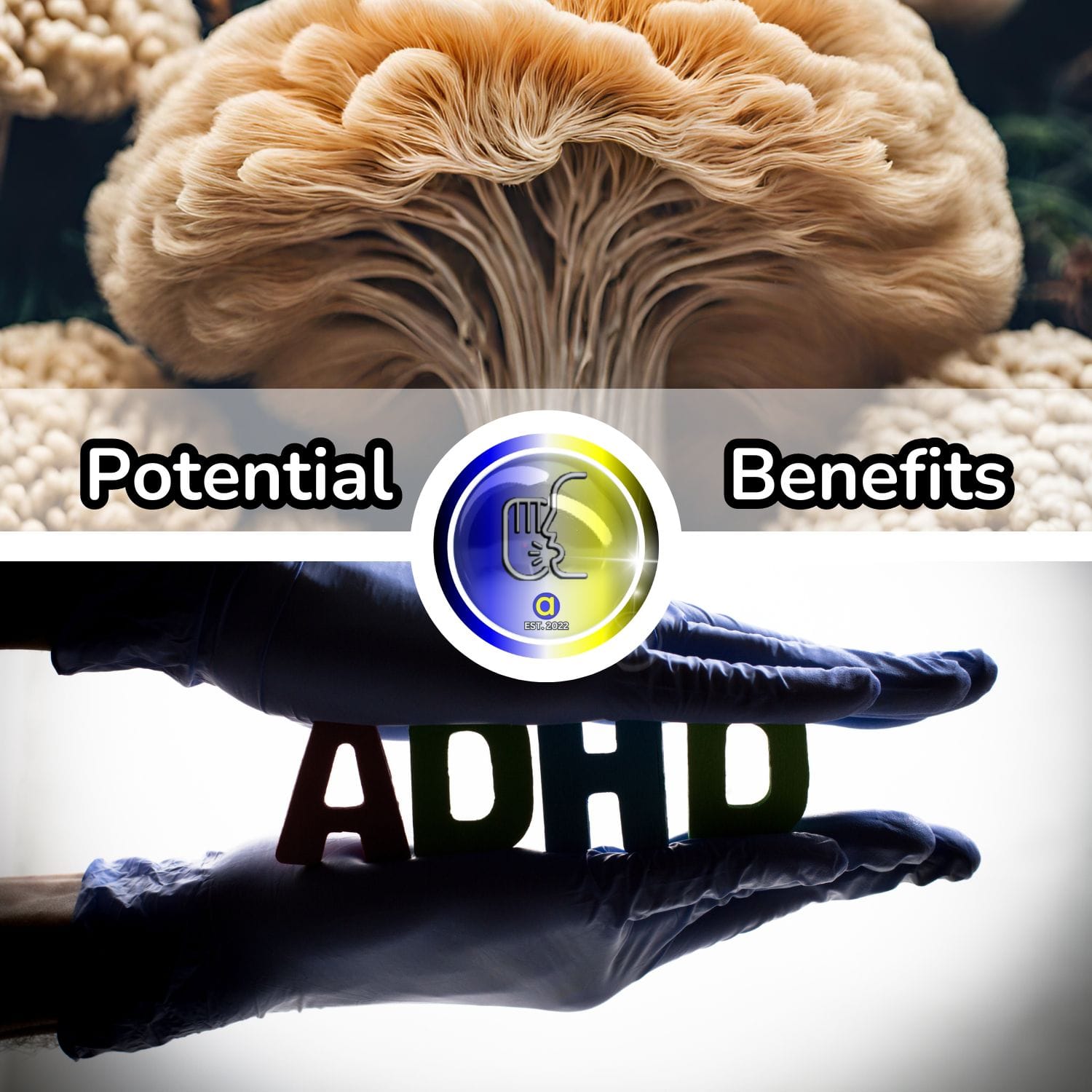Imagine an All-Natural Solution for Managing ADHD
Attention Deficit Hyperactivity Disorder (ADHD), a neurodevelopmental disorder that affects millions worldwide. Enter Lion’s Mane, a mushroom that may hold the key to boosting cognitive function and overall brain health. But, is Lion’s Mane good for ADHD? Could this humble mushroom provide an alternative to traditional ADHD medication? Let’s embark on this journey of discovery together, asking the question: “Is lions mane good for adhd?”
Exploring Lion's Mane: A Natural Solution for ADHD?

Lion’s Mane, known for its significant role in traditional Chinese medicine, is gaining recognition as a potential natural remedy for managing ADHD symptoms. Originating from Chinese medicine and now a common ingredient in dietary supplements, Lion’s Mane for ADHD has attracted those in search of natural ADHD management solutions.
The Science Behind Lion's Mane

Lion’s Mane, scientifically known as Hericium Erinaceus, is a medicinal mushroom renowned for its cognitive-enhancing properties. Lion’s mane mushroom, or lion’s mane extract, contains bioactive compounds called hericenones and erinacines that stimulate the production of nerve growth factor (NGF) proteins. These proteins play a pivotal role in supporting the growth and repair of neurons, potentially improving cognitive function and brain plasticity. Some benefits of Lion’s Mane include:
- Enhanced memory and focus
- Increased mental clarity
- Improved mood and overall cognitive function
- Potential neuroprotective effects
Incorporating Lion’s Mane into your diet or taking lion’s mane as a supplement may help support brain health and cognitive function, providing brain boosting benefits by nurturing brain cells, and offering health benefits.
Lion's Mane and Cognitive Enhancements
As for cognitive enhancements, studies suggest that Lion’s Mane could significantly alter the landscape, particularly for those experiencing mild cognitive impairment. This mushroom has shown potential in improving memory and focus, which are often impaired in individuals with ADHD.
Understanding ADHD and Its Impact

ADHD, or Attention Deficit Hyperactivity Disorder, isn’t merely about difficulty in maintaining focus. It’s a complex condition that falls under the category of mental health disorders, bringing about a variety of symptoms with significant effects on an individual’s life.
Key Symptoms of ADHD
ADHD manifests as a mental storm, marked by a turbulent mix of inattention, hyperactivity, and impulsivity. Individuals with ADHD often find it challenging to sit still, focus on tasks, or think before acting.
Current ADHD Treatments
Managing ADHD traditionally involves a combination of medications and behavioral therapies for ADHD patients. However, these treatments are not without their challenges.
The Role of Lion's Mane in ADHD Management

As we examine more closely the possible role of Lion’s Mane in managing ADHD, bear in mind that while promising, this mushroom is not a cure-all. It presents as a supplement that could potentially amplify the impacts of established treatments and lifestyle modifications.
Can Lion's Mane Improve Focus in ADHD?
Turning our attention to focus, a core issue in ADHD, can Lion’s Mane help? Research suggests that this mushroom may indeed offer potential benefits in this area.
Lion's Mane's Influence on Mood Disorders
Beyond improving focus, Lion’s Mane may also have a positive influence on mood disorders, such as anxiety and depression, often associated with ADHD.
Integrating Lion's Mane into ADHD Treatment Plans
Given the potential benefits of Lion’s Mane for ADHD, it’s natural to ponder how it can be integrated into an ADHD treatment plan. This process involves considering its compatibility with other treatments and supplements, and consultation with healthcare professionals.
Compatibility with Other Dietary Supplements
One of the key considerations when adding Lion’s Mane to an ADHD treatment plan is its compatibility with other dietary supplements.
Consulting Healthcare Professionals
Before deciding to procure Lion’s Mane supplements, it’s of utmost importance to seek advice from a healthcare professional.
Personal Experiences: Lion's Mane and ADHD
Beyond research and scientific evidence, more research and personal experiences also offer insightful perspectives on the potential benefits of Lion’s Mane for ADHD.
Potential Side Effects and Considerations

Like any supplement, Lion’s Mane comes with potential side effects and considerations that one must be aware of.
Dosage and Administration
Correct dosage of Lion’s Mane is imperative to guarantee its effectiveness and reduce possible side effects.
Recognizing Allergic Reactions and Interactions
While Lion’s Mane is generally safe for most people, allergic reactions, although rare, can still occur.
Summary
We’ve journeyed from the basics of ADHD and Lion’s Mane to the potential benefits and considerations of integrating this mushroom into ADHD treatment plans.

Q: Which mushroom is best for ADHD?
A: Mane mushroom is an effective choice for individuals with ADHD due to its various health benefits. It is the most commonly recommended mushroom for those living with ADHD.
Q: What is the #1 supplement helpful for ADHD?
A: Omega-3 Fatty Acids are the most studied supplement for ADHD and have been found to be effective in reducing hyperactivity, improving attention, and decreasing impulsivity.
Q: Does lion's mane work like Adderall?
A: Based on their different mechanisms of action, Adderall and Lion's Mane mushrooms appear to have different effects on the brain. Adderall increases neurotransmitter levels quickly while Lion's Mane mushrooms support brain health more slowly.
Q: Who should avoid Lion's Mane?
A: Pregnant or breastfeeding women and those with clotting disorders should avoid lion's mane, as it may slow blood clotting which can lead to excessive bleeding.







